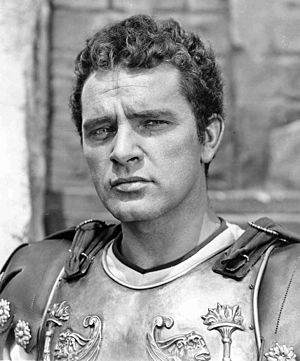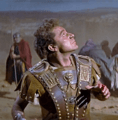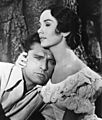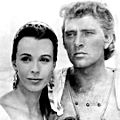Richard Burton facts for kids
Quick facts for kids
Richard Burton
|
|
|---|---|

Burton in The Robe (1953)
|
|
| Born |
Richard Walter Jenkins Jr.
10 November 1925 Pontrhydyfen, Wales
|
| Died | 5 August 1984 (aged 58) Céligny, Switzerland
|
| Occupation | Actor |
| Years active | 1943–1984 |
| Spouse(s) |
(m. 1975; div. 1976)Suzy Miller
(m. 1976; div. 1982)Sally Hay
(m. 1983) |
| Children | 3, including Kate Burton |
Richard Burton CBE (/ˈbɜːrtən/; born Richard Walter Jenkins Jr.; 10 November 1925 – 5 August 1984) was a famous Welsh actor. He was known for his amazing voice. In the 1950s, he became a strong Shakespearean actor. His performance as Hamlet in 1964 was very memorable.
Many people thought he was one of the best actors of his time. He was nominated for an Academy Award seven times. He won BAFTAs, Golden Globes, and Tony Awards for Best Actor. In the mid-1960s, he was a top movie star. He was one of the highest-paid actors in the world.
Burton was also well-known for his relationship with his second wife, Elizabeth Taylor. They married and divorced twice. Their relationship was often in the news.
Contents
Richard Burton's Early Life
Growing Up in Wales
Richard Walter Jenkins Jr. was born on 10 November 1925. He was born in Pontrhydyfen, Glamorgan, Wales. He was the twelfth of thirteen children. His family spoke Welsh. His father, Richard Walter Jenkins Sr., was a coal miner. His mother, Edith Maude Jenkins, worked at a pub.
Richard was only two years old when his mother died. His older sister, Cecilia, took care of him. He called her "Cis." Richard lived with Cis and her husband, Elfed James. They lived in Taibach, a town in Port Talbot. Richard was always thankful to Cis.
His brother Ifor, 19 years older, was also important. Ifor was a miner and a rugby union player. He taught Richard to love rugby. Richard played other sports too, like cricket and tennis. But rugby was his favorite. He once said he would rather play rugby for Wales than act as Hamlet.
Richard's School Days
From age five to eight, Richard went to Eastern Primary School. He then went to the Boys' section until he was twelve. In 1937, he passed an exam to go to Port Talbot Secondary School. He was the first in his family to go to secondary school.
Richard had a great speaking and singing voice. He won a prize for singing as a boy. He loved reading poetry and literature. He earned money by delivering newspapers.
Meeting Philip Burton
Richard wanted to win more singing prizes. He asked his school teacher, Philip Burton, for help. This was the start of their close relationship. Philip said Richard's voice became "memorably beautiful" with practice.
Richard first acted in a school play called The Apple Cart. He thought about leaving school to work as a miner. But he also considered boxing, religion, and singing.
He joined the Air Training Corps. There, he met Philip again, who was a squadron commander. Richard also joined a youth drama group. He learned acting basics there. Philip saw Richard's talent. He helped Richard get back into school. Philip taught him school subjects and helped him develop his acting voice. Richard called this time "the most hardworking and painful period" of his life. Philip said Richard was "my son to all intents and purposes." Richard later wrote, "I owe him everything."
In 1943, Richard became Philip's legal ward. He changed his last name to "Burton" after Philip. This was also the year Richard qualified for university. Philip wanted him to study at Exeter College, Oxford.
Richard Burton's Acting Career
Early Roles and Military Service (1943–1947)
In 1943, Burton played Professor Henry Higgins in a school play. This role got him noticed by playwright Emlyn Williams. Williams offered Burton a small part in his play The Druid's Rest. The play opened in Liverpool in November 1943. It later came to London in January 1944. Burton was paid ten pounds a week, which was a lot at the time. A critic from the New Statesman praised Burton's "exceptional ability." Burton said this one sentence changed his life.
At Oxford University, Burton acted in a William Shakespeare play. He played Angelo in Measure for Measure in 1944. Famous theatre people like John Gielgud saw his performance. Gielgud was impressed.
In late 1944, Burton finished his studies at Oxford. He joined the Royal Air Force (RAF) as a navigator trainee. He served for three years. He was discharged from the RAF in December 1947.
Starting in Films (1948–1951)
In 1948, Burton moved to London. He met Binkie Beaumont, who gave him a contract. He also got a small role in a play called Castle Anna.
Burton got his first film role in The Last Days of Dolwyn (1949). He met Sybil Williams on the set and they married in 1949. Critics praised Burton's "acting fire" and "good looks." A critic called it an "impressive movie debut."
After this success, Alexander Korda offered Burton a contract. He would be paid £100 a week. This allowed Burton to act in films for other companies. He appeared in small roles in several British films. These included Now Barabbas (1949) and The Woman with No Name (1950).
Burton's performance in Now Barabbas received good reviews. A critic said he had "all the qualities of a leading man."
He then got a supporting role in The Lady's Not for Burning (1949). John Gielgud directed this play. Burton was paid £15 a week for this role. The play was a big success in London and later on Broadway. Burton won the Theatre World Award for his performance. This was his first major award.
Burton continued to act in plays. He played Prince Hal in Shakespeare's Henry IV, Part I and Henry IV, Part 2. Many critics called him "the next Laurence Olivier." American actors Humphrey Bogart and Lauren Bacall also praised him. Burton bought his first car with his earnings.
Hollywood Success and The Old Vic (1952–1954)
In 1952, Burton moved to Hollywood. He got a lead role in the film My Cousin Rachel. He starred opposite Olivia de Havilland. He was paid $50,000 per film for three films.
My Cousin Rachel was a success at the box office. Burton's acting received excellent reviews. He won the Golden Globe Award for New Star of the Year – Actor. He also got his first Academy Award nomination.
The year 1953 was very important for Burton. He starred in the war film The Desert Rats. He played an English captain in World War II. Critics gave the film good reviews.
His second film of 1953 was The Robe. This was a big historical drama. It was the first movie ever made in CinemaScope. Burton played Marcellus Gallio, a Roman soldier involved in the crucifixion of Jesus Christ. The film was a commercial success. Burton received his second Academy Award nomination for Best Actor.
After The Robe, Burton was offered a huge $1 million contract. But he turned it down. He wanted to go back to the UK to play Prince Hamlet at The Old Vic theatre. This decision surprised many people. It showed his dedication to theatre.
Burton began rehearsing for Hamlet in July 1953. Philip helped him prepare. The play opened in September 1953. Critics praised Burton's "bold and virile" Hamlet. He was very popular with young audiences.
He also played Gaius Marcius Coriolanus in Coriolanus. He received even better reviews for this role. Laurence Olivier said it was the greatest Coriolanus he had ever seen.
Burton also acted in other plays at The Old Vic. He played Sir Toby Belch in Twelfth Night and Caliban in The Tempest. His presence made The Old Vic season a big success. He also narrated a BBC Radio play called Under Milk Wood in 1954.
Film Challenges and Stage Triumphs (1955–1959)
After The Old Vic, Burton had to make three more films for Fox. The first was Prince of Players (1955). He played a 19th-century Shakespearean actor. The film did not do well at the box office.
He then starred in Alexander the Great (1956). He played the main character. This film reunited him with Claire Bloom. He also made The Rains of Ranchipur (1955). Both films were not successful.
Burton returned to The Old Vic to perform Henry V again. This time, he received glowing reviews. A critic famously said Burton was now "the next successor to Olivier." He won the Theatre Award for Best Actor for this role.
He also played both Othello and Iago in Othello. He was praised for his Iago.
His film career continued to struggle. Sea Wife (1957) and Bitter Victory (1957) were not successful. In 1957, his first daughter, Kate Burton, was born.
He then starred in the play Time Remembered (1957) on Broadway. The play was well received. It ran for six months. Burton was nominated for his first Tony Award for Best Actor in a Play.
In 1958, Burton played Heathcliff in a TV adaptation of Wuthering Heights. Critics praised his performance.
His next film was Look Back in Anger (1959). He played Jimmy Porter, an "angry young man." This film is now seen as important for British cinema. Burton was nominated for a BAFTA and a Golden Globe for this role.
Broadway, Hamlet, and Films with Elizabeth Taylor (1960–1969)
In 1960, Burton starred as King Arthur in the Broadway musical Camelot. Julie Andrews played Guinevere. He was paid $4,000 a week. The show was very long at first. Philip helped revise the script and cut it down.
Burton's performance received excellent reviews. A critic called his performance "skillful and vastly appealing." The show became a huge success. It ran for three years. Burton won the Tony Award for Best Actor in a Musical. He was called "The King of Broadway."
In 1962, Burton appeared in the war film The Longest Day. He also narrated a documentary about Dylan Thomas. This documentary won an Academy Award.
In 1961, Burton was asked to play Mark Antony in the film Cleopatra. He was paid $250,000. During filming, he met and fell in love with Elizabeth Taylor. Their relationship caused a lot of public attention. Life magazine called Cleopatra the "Most Talked About Movie Ever Made."
Cleopatra was released in 1963. It received mixed reviews. But it was a commercial success. It made Burton one of the top movie stars. He divorced Sybil in 1963. Taylor divorced her husband in 1964. They became known as "Liz and Dick."
Burton and Taylor continued to make films together. They earned a lot of money. Burton said Taylor helped him choose better roles.
In 1964, Burton played Thomas Becket in the film Becket. He starred with his friend Peter O'Toole. Critics praised Burton's performance. The film received twelve Oscar nominations. Both Burton and O'Toole were nominated for Best Actor.
Burton also starred in The Night of the Iguana (1964). This film was also well received. Time magazine called him "the new Mr. Box Office."
In 1964, Burton performed Hamlet again in New York City. John Gielgud directed it. The play was performed like a rehearsal. Burton's Hamlet received good reviews. A critic called it "a performance of electrical power." The play ran for 137 performances, setting a new record.
Burton and Taylor also performed "A Poetry Reading" together. This was to raise money for Philip's school.
After their marriage, Burton and Taylor made more films. The Sandpiper (1965) was not well received but made money. Burton then starred in The Spy Who Came In from the Cold (1965). This film received positive reviews.
In 1966, Burton and Taylor had their biggest success together. They starred in Who's Afraid of Virginia Woolf?. They played a couple who argue a lot. Burton wanted Taylor for the role of Martha. He thought it would be as important for her as Hamlet was for him.
The film's script was very raw and showed a harsh marriage. Both Burton and Taylor found it hard to stop being their characters after filming. The film received critical acclaim. Both Burton and Taylor won BAFTA Awards for their roles.
Burton and Taylor also performed in a stage version of Doctor Faustus (1966). Taylor played Helen of Troy. The play received negative reviews. But it raised money for charity. They also made a film version of Doctor Faustus (1967). It was not successful.
Their next film was The Taming of the Shrew (1967). This was a lively version of Shakespeare's play. It was a critical and commercial success. By the end of 1967, their films had earned $200 million.
Later films like The Comedians (1967) and Boom! (1968) were not successful.
In 1968, Burton starred with Clint Eastwood in Where Eagles Dare. This was a successful action film. Burton was paid $1 million. His daughter Kate said he made it for them, so they could see a fun movie.
His last film of the decade was Anne of the Thousand Days (1969). He played Henry VIII of England. He was paid $1.25 million. The film was successful. Burton was nominated for an Academy Award for this role.
Later Career and Final Years (1970–1984)
In 1970, Burton received a CBE honor. This happened at Buckingham Palace. Taylor and Cis were there.
From the 1970s, Burton started working in less successful films. This was partly because of his and Taylor's spending. He said he needed to work for money.
His last film with Taylor was Divorce His, Divorce Hers (1973). He did have a major success with the film version of his play Equus (1977). He won a Golden Globe Award and was nominated for an Academy Award. Many thought he would finally win an Oscar, but he did not.
In 1976, Burton won a Grammy Award for narrating The Little Prince. His narration for Jeff Wayne's Musical Version of The War of the Worlds was also very popular.
Burton had a successful film with The Wild Geese (1978). This was an adventure story about mercenaries. He also appeared in The Medusa Touch (1978) and Circle of Two (1980). He played the main role in Wagner (1983).
His last film was Nineteen Eighty-Four (1984). He played O'Brien. His performance was praised.
At the time of his death, Burton was preparing for Wild Geese II. This was a sequel to The Wild Geese.
Richard Burton's Personal Life
Burton was married five times. He married Elizabeth Taylor twice.
From 1949 to 1963, he was married to Sybil Williams. They had two daughters: Kate (born 1957) and Jessica (born 1959).
His first marriage to Taylor lasted from 1964 to 1974. Their second marriage was from 1975 to 1976. Taylor and her previous husband had adopted a daughter, Maria. Burton re-adopted Maria after he married Taylor. He also re-adopted Taylor's daughter, Liza, from a previous marriage.
Burton and Taylor's relationship was often compared to their characters in Who's Afraid of Virginia Woolf?. Burton once said Taylor had "wonderful eyes."
In August 1976, Burton married model Suzy Miller. They divorced in 1982. From 1983 until his death, he was married to Sally Hay.
In 1974, he was briefly engaged to Princess Elizabeth of Yugoslavia.
In 1957, Burton moved to Céligny, Switzerland. He bought a villa there. This was because of tax reasons.
Burton admired the actor and writer Emlyn Williams. He hired Williams' son, Brook Williams, as his assistant. Brook also had small roles in some of Burton's films.
Richard Burton's Death
Richard Burton died on 5 August 1984. He was 58 years old. He died from a brain hemorrhage at his home in Céligny, Switzerland.
He was buried at the Old Cemetery in Céligny. A copy of Dylan Thomas's poems was buried with him. He and Taylor had talked about being buried together. But his widow, Sally, bought the plot next to his. She put a large headstone across both plots. This was to prevent Taylor from being buried there.
Burton left an estate worth about $4.58 million. Most of it went to his widow.
Richard Burton's Achievements
For his work in films, Burton was honored. He was added to the Hollywood Walk of Fame in 2013. His star is at 6336 Hollywood Boulevard. For his work in theatre, he was added to the Theatre Hall of Fame.
Selected Works and Awards
| Year | Project | Award |
|---|---|---|
| 1951 | The Lady's Not for Burning | Theatre World Award |
| 1952 | My Cousin Rachel | Golden Globe Award for New Star of the Year – Actor Nominated—Academy Award for Best Supporting Actor |
| 1953 | The Robe | Nominated—Academy Award for Best Actor |
| 1958 | Time Remembered | Nominated—Tony Award for Best Actor in a Play |
| 1959 | Look Back in Anger | Nominated—BAFTA Award for Best British Actor Nominated—Golden Globe Award for Best Actor – Motion Picture Drama |
| 1961 | Camelot | Tony Award for Best Actor in a Musical |
| 1964 | Becket | Laurel Award for Top Male Dramatic Performance Nominated—Academy Award for Best Actor Nominated—Golden Globe Award for Best Actor – Motion Picture Drama |
| Hamlet | Nominated—Tony Award for Best Actor in a Play | |
| 1965 | The Spy Who Came in from the Cold | BAFTA Award for Best British Actor (also for Who's Afraid of Virginia Woolf?) David di Donatello for Best Foreign Actor Laurel Award for Top Male Dramatic Performance Nominated—Academy Award for Best Actor |
| 1966 | Who's Afraid of Virginia Woolf? | BAFTA Award for Best British Actor (also for The Spy Who Came in from the Cold) Bambi Award for Best International Actor Laurel Award for Top Male Dramatic Performance National Society of Film Critics Award for Best Actor (2nd place, tied with Max von Sydow for Hawaii) New York Film Critics Circle Award for Best Actor (2nd place) Nominated—Academy Award for Best Actor Nominated—Golden Globe Award for Best Actor – Motion Picture Drama |
| 1967 | The Taming of the Shrew | David di Donatello for Best Foreign Actor (tied with Peter O'Toole for The Night of the Generals) Nominated—BAFTA Award for Best British Actor Nominated—Golden Globe Award for Best Actor – Motion Picture Musical or Comedy |
| 1969 | Anne of the Thousand Days | Nominated—Academy Award for Best Actor Nominated—Golden Globe Award for Best Actor – Motion Picture Drama |
| 1973 | Massacre in Rome | Taormina International Film Festival Award for Best Actor |
| 1976 | The Little Prince (Album) | Grammy Award for Best Recording for Children (featuring Jonathan Winters and Billy Simpson) |
| 1977 | Equus | Golden Globe Award for Best Actor – Motion Picture Drama Nominated—Academy Award for Best Actor |
| 1984 | Nineteen Eighty-Four | Valladolid International Film Festival Award for Best Actor (shared with John Hurt) |
| Ellis Island | Nominated—Primetime Emmy Award for Outstanding Supporting Actor in a Miniseries or a Movie |
Images for kids
-
A Blue plaque at Richard Burton's Hampstead address.
-
John Gielgud (photographed 1953) directed Burton in The Lady's Not For Burning.
-
Burton with Olivia de Havilland in My Cousin Rachel (1952).
-
Burton with Maggie McNamara in Prince of Players (1955).
-
Burton with Claire Bloom in Alexander the Great (1956).
-
Burton with Yvonne Furneaux in Wuthering Heights (1958).
-
Burton and Julie Andrews in Broadway's Camelot.
-
Burton as Mark Antony in Cleopatra (1963), with Elizabeth Taylor as Cleopatra.
See also
 In Spanish: Richard Burton para niños
In Spanish: Richard Burton para niños
 | Claudette Colvin |
 | Myrlie Evers-Williams |
 | Alberta Odell Jones |

















